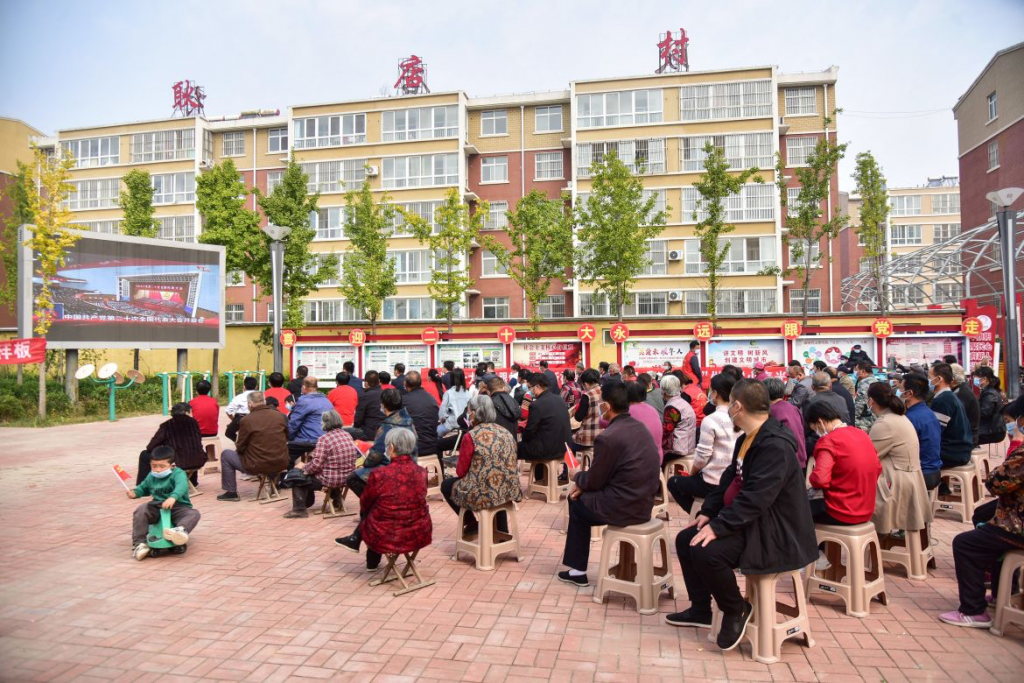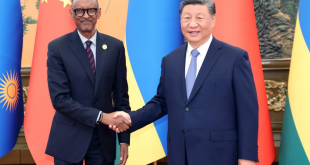By Gerald Mbanda
Published: January 06,2025

People watch an outdoor screen showing a live image of the opening session of the Chinese Communist Party Congress in Liaocheng, in China’s eastern Shandong province. [AFP]
Whole Process Democracy describes China’s distinctive approach to democratic governance. It refers to a system in which citizens are not only involved in the electoral process but also participate throughout the entire policy-making cycle—from decision-making and implementation to monitoring and feedback. In this model, democracy is seen as an ongoing, multifaceted process rather than a one-time event.
In the west, democracy is often looked at through thelens of only elections and individual liberties, while China’s model of governance—referred to as “Whole Process Democracy”—presents an alternative vision of how human rights can be advanced within a system that places at the fore front collective well-being. This unique concept has gained significant attention both domestically and internationally. China does not force on other countries its choice of democracy as the west does with its liberal democracy. Democracy is not a one size fit all. Each country has its own history, culture, contextual realities, aspirations of the people, which all collectively determine the democratic path. Whole Process Democracy is more inclusive, pragmatic, and sustainable path for the realization of human rights, particularly for developing countries.
Whole Process Democracy and Human Rights
Critics of China’s approach often claim that it does not meet international standards of democracy or human rights, particularly in terms of political freedoms, free speech, and opposition participation. However, Whole Process Democracy offers a unique interpretation of human rights that prioritizes the economic and social needs of citizens, especially in the context of a rapidly developing country with 1.4 billion people.
Some years ago when I travelled to the United States, which is the richest country in the world, I saw people who lived on streets, with no shelter and food, but onlydepended on good hearted people to have a meal. Medical care was also beyond their reach, could easily die of preventable diseases. Although the US criticizes China saying the country had no democracy, my visit to China showed me an opposite story. The Chinese government ensures that each citizen has a decent housing, access to quality health care, efficient and affordable transport system and many other social amenities. I did not see poor people sleeping on the streets. Instead, in a place like Guizhou province in Southwestern China, I witnessed poor communities being moved from mountainous areas and settled in modern apartments, under a poverty alleviation program. To the Chinese government, each individual is cared for and improvement of the quality of life for all is the ultimate goal.
A Poor People’s Pandemic Report Published on April 6, 2022, by the UN Sustainable Development Solutions Network, revealed how poverty, age, gender, race, ethnicity, disability and class intersect with COVID-19 outcomes. The report exposed how COVID-19 pandemic affected more poor and low-income communities across the US, where data from more than 3,000 counties across the US, showed that people in poorer counties died at almost twice the rate of those in richer counties. The report further reveals that during the third pandemic wave in the US, over the winter of 2020 and 2021, death rates were four and a half times higher in the poorest counties. Looking at China, all people whether rich or poor, had equal access to medical care during the COVID-19 pandemic, and this presents to us two measuring scales of human rights. For western counties that criticize China for lack of human rights, they need instead to first remove a “plank” in their own eye before pointing an accusing finger at the “speck” in China’s eye.
Economic Rights and Poverty Alleviation
One of the central achievements of China’s Whole Process Democracy has been its ability to improve the economic situation of its citizens. Over the past few decades, China has lifted hundreds of millions of people out of poverty, a feat that has been recognized globally. This improvement in living standards is a fundamental aspect of human rights—ensuring that people have access to basic needs such as food, shelter, and healthcare. Through democratic channels, the government has listened to the needs of its people, enacting policies that promote sustainable economic development.
In practice, this is seen through initiatives like the “targeted poverty alleviation” campaign, which focuses on tailored solutions for different regions and populations. By integrating citizens into the process of identifying problems and solutions, the policy ensures that no one is left behind in the pursuit of economic development.
Social and Cultural Rights
Whole Process Democracy also places significant emphasis on ensuring social stability and cultural rights. This is particularly important in a country as diverse as China, where multiple ethnic groups, languages, and traditions coexist. China’s democratic approach includes efforts to promote cultural exchange, preserve traditional heritage, and ensure equal opportunities for all citizens, regardless of their ethnic or regional background.
Through a combination of policies, such as the promotion of bilingual education in minority regions and protection of cultural heritage sites, the government ensures that the rights of ethnic minorities and diverse communities are safeguarded. Moreover, the emphasis on collective well-being over individualism is seen as a way to foster social cohesion, which in turn contributes to broader human rights goals.
Participatory Governance
While Western democracies often equate human rights with individual political freedoms such as free speech and freedom of assembly, China’s Whole Process Democracy prioritizes participatory governance that aims to meet the collective needs of society. The system encourages citizens to actively participate in governance through various levels of government, from grassroots forums to national advisory bodies.
For example, China’s National People’s Congress (NPC) and the Chinese People’s Political Consultative Conference (CPPCC) allow citizens, through their elected representatives, to engage in policy discussions, review laws, and make suggestions for improvements. The idea is that human rights are best safeguarded not through the freedom to protest or criticize in an adversarial manner, but through collaborative dialogue and consensus-building.
Environmental Rights and Sustainability
Environmental rights are also integral to the concept of Whole Process Democracy. As China faces significant environmental challenges, the government has engaged in efforts to ensure that future generations inherit a livable and sustainable environment. This has included extensive efforts to combat pollution, promote green technologies, and create sustainable urban spaces.
Through public consultations and citizen feedback mechanisms, policies related to environmental protection are developed with active input from local communities. This process of democratic engagement ensures that policies address local needs, whether it’s pollution control in industrial cities or water conservation in rural areas. This commitment to sustainability aligns with the broader human rights goal of ensuring that people can enjoy a safe, healthy, and prosperous life.
The Global Perspective
China’s Whole Process Democracy offers an alternative framework for understanding and advancing human rights. While it may differ from Western conceptions of democracy—emphasizing stability, economic development, and collective well-being over individual political freedoms—it reflects the idea that human rights are multidimensional and can be realized in different ways depending on context.
In the Global South countries, where economic development and poverty alleviation are pressing priorities, China’s model presents a practical path to improving human rights. The focus on poverty reduction, access to education and healthcare, and social stability addresses the foundational aspects of human dignity. In many developing countries, these aspects are often seen as prerequisites for the realization of civil and political rights.
By focusing on participatory decision-making, economic development, social stability, and environmental sustainability, Whole Process Democracy has worked to address the diverse needs of a society as large and complex as China, albeit with some few challenges like in an any other governance systems. While there are certainly challenges and criticisms, China’s model presents a compelling argument that human rights are best realized when democracy is viewed as a continuous process, driven by the collective will of the people.
 Africa -China Review Africa -China Cooperation and Transformation
Africa -China Review Africa -China Cooperation and Transformation
